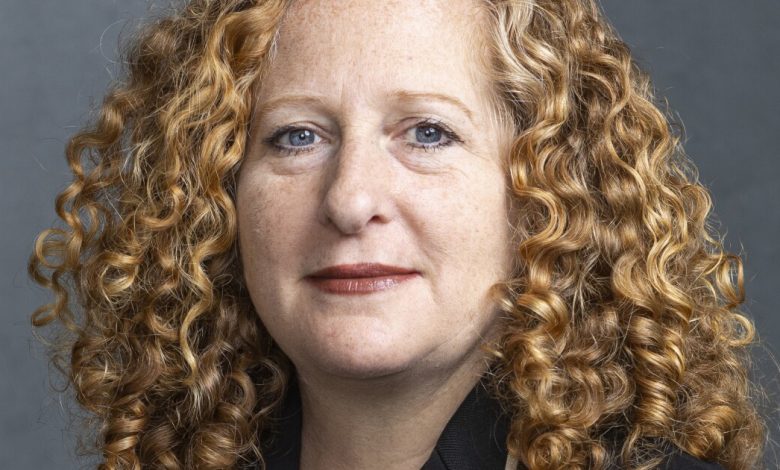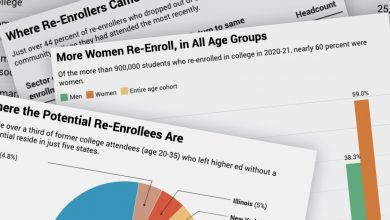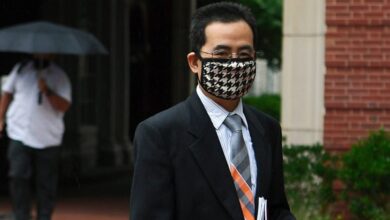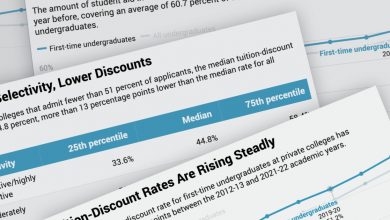Wisconsin Has a New Chancellor. GOP Lawmakers Aren’t Happy.

Republican lawmakers have been quick to condemn the new chancellor of the University of Wisconsin at Madison, with one state senator saying he’d consider pulling the institution’s state funding over the decision to hire her. But the vice chair of the Wisconsin system’s board said on Tuesday that she doesn’t think those threats will come to pass.
On Monday, the system’s Board of Regents unanimously approved the selection of Jennifer L. Mnookin, dean of the University of California at Los Angeles’s School of Law, to lead the flagship campus. Mnookin was tapped by the regents to replace Rebecca M. Blank, who is leaving to become president of Northwestern University. Mnookin was one of five finalists for the chancellor’s post.
Robin Vos, the Republican speaker of the Wisconsin State Assembly, deemed it a “blatant partisan selection” and called on the board to reconsider. Vos said that Mnookin’s selection marked a “step backward” from the work of Blank and of Tommy Thompson, a former Wisconsin governor who stepped down as interim president of the system this year. Both leaders “attempted to strengthen relationships between the university and the legislature,” Vos wrote in a statement.
“We deserve campus leaders who will encourage healthy debate, diverse thoughts, and freedom of expression,” Vos wrote. “Given her obvious viewpoints and political donations, Dr. Mnookin needs to prove she supports free speech on campus and not politically correct ideologies.” According to federal campaign-finance records, Mnookin has donated to the presidential campaigns of Barack Obama, Hillary Clinton, and Joe Biden.
Vos wrote that Mnookin “wholeheartedly supports critical race theory being taught on campus, is in favor of widespread vaccine mandates, and also met with Hunter Biden in 2019 to entertain a proposal that he join the UCLA faculty to teach drug policy.” As the Milwaukee Journal-Sentinel reported, Mnookin has publicly expressed support for the critical-race-studies program at UCLA’s law school and moderated a panel last summer about attacks on critical race theory. She also wrote an op-ed for the Los Angeles Times in February 2021 advocating for Covid-19 vaccines to be made available to college students and shared on Twitter an LA Times op-ed that lauded the University of California system’s vaccine mandate.
Given her obvious viewpoints and political donations, Dr. Mnookin needs to prove she supports free speech on campus and not politically correct ideologies.
On Tuesday, Mnookin expressed support for research and teaching about critical race theory, as well as for the exchange of ideas generally. “I think that freedom of speech is incredibly important, and we need to create spaces for ideas of all different kinds to be part of the dialogue within universities,” she said during a news conference. “I’m excited to be part of those conversations. I think those ideas do include critical race theory, sure, and lots of other ideas, too.”
Judith A. Wilde, a research professor at George Mason University’s Schar School of Policy and Government, was skeptical of the use of Mnookin’s support for critical race theory as an argument against her chancellorship. “I don’t know of any place that really, truly teaches a curriculum that is called critical race theory,” she said. “It’s sort of like the toy balloon you put up to scare people so that you can pop the balloon and say, ‘Aha, see, we saved you from this.’”
In his own statement, State Sen. Stephen L. Nass, vice chair of the state Senate’s committee on universities and technical colleges and a Republican from Whitewater, echoed Vos’s criticisms. “If the Board of Regents truly believes that Mnookin is the best choice, then the next Republican governor and legislature should find it impossible to provide more taxpayer dollars or allow the board to increase tuition,” Nass said.
At least one Wisconsin leader didn’t read much into Nass’s comments. Karen Walsh, vice president of the Board of Regents and co-chair of the search process that resulted in Mnookin’s selection, said on Tuesday that she didn’t think the system’s funding would be threatened.
“It’s a free country, and people can say what they want. Honestly, I don’t take those comments very seriously. I don’t think that’s realistic,” Walsh said during a news conference. “I would like for those folks to meet Chancellor Mnookin before they threaten our funding. I don’t think they really intend to do that.”
Vos tweeted of Walsh’s remarks: “It’s this same arrogant and dismissive attitude that’s the problem on issues like campus free speech.”
Joining in criticisms of Mnookin’s selection were the former Lt. Gov. Rebecca Kleefisch of Wisconsin and the onetime U.S. Senate candidate Kevin Nicholson, both Republicans running for governor. Kleefisch called Mnookin a “woke radical,” saying “our universities need to focus on building a strong economy and workforce — not force-feeding liberal ideology to Wisconsin students.”
Mark Pitsch, a spokesman for the Wisconsin system, pointed out that the board that approved Mnookin includes members appointed by both Gov. Tony Evers, a Democrat, and his Republican predecessor, Scott Walker. (Nine Wisconsin regents were selected by Evers and seven by Walker.) “The UW Board of Regents selection process for chancellors and the president is rigorous and well-considered, and has resulted in a talented, diverse group of leaders at universities across Wisconsin, including Chancellor-designate Mnookin,” Pitsch said in a statement. “We look forward to her arrival at UW-Madison.”
‘Political Theater’
Mnookin’s hiring isn’t the first time in recent weeks that Wisconsin Republicans have sought to influence the university system’s actions.
Last month, one of the system’s chancellors resigned over a controversial plan to poll students in the University of Wisconsin system about free speech. Some in the system expressed concern that its results could be misused by Republican legislators who were making claims about liberal indoctrination. The survey, originally scheduled to be conducted last month, was delayed until fall. Vos said in a statement at the time that he was disappointed about the delay, adding: “I believe we have a problem on our campuses.”
I would like for those folks to meet Chancellor Mnookin before they threaten our funding.
Republicans’ response to Mnookin’s appointment is indicative of a larger trend of legislative meddling in higher education, said Christian K. Anderson, an associate professor of higher education at the University of South Carolina.
It’s understandable, he said, that legislators would take note of the goings-on at their local public universities, “but it seems to be increasingly frequent that they are trying to intervene or get involved.” Anderson cited his own state, where Gov. Henry McMaster, a Republican, in 2019 urged trustees to vote for the ill-fated Lt. Gen. Robert L. Caslen Jr.as the institution’s next president, and where state politicians objected to the renaming of buildings that honored slave-owners and segregationists on campus.
“I think a lot of it’s political theater — someone making a fuss, trying to score political points,” Anderson said. “Higher education is an easy target.”
Rescinding Mnookin’s selection, as Vos suggested, would be “very difficult,” Anderson said. “If that were to happen, that really would be incredibly problematic, because then you’re always on edge as to whether or not you’re able to just make basic employment decisions without being attacked or scrutinized.” Comments like Vos’s, he said, mark “a form of challenge to institutional autonomy, which is ultimately a challenge to academic freedom.”
Wilde offered another recent example: Last week, Gov. Glenn Youngkin of Virginia told the state’s public-college presidents that he expects them to hire faculty and staff members “with diverse political perspectives,” the Richmond Times-Dispatch reported. Doing so, wrote Youngkin, a Republican, would “nurture a culture that prioritizes civil discourse and debate, both inside and outside the classroom.”
And in Colorado, Wilde pointed out, Mark R. Kennedy stepped down in 2021 after two years at the helm of the state system. A narrow Republican majority voted 5 to 4 to appoint Kennedy in 2019, but when the 2020 elections gave Democrats control of the board, Kennedy left, citing the board’s “new makeup” and “changes in its focus and philosophy.” Colorado’s system is one of the few in the nation where a governing board is chosen in partisan elections.






